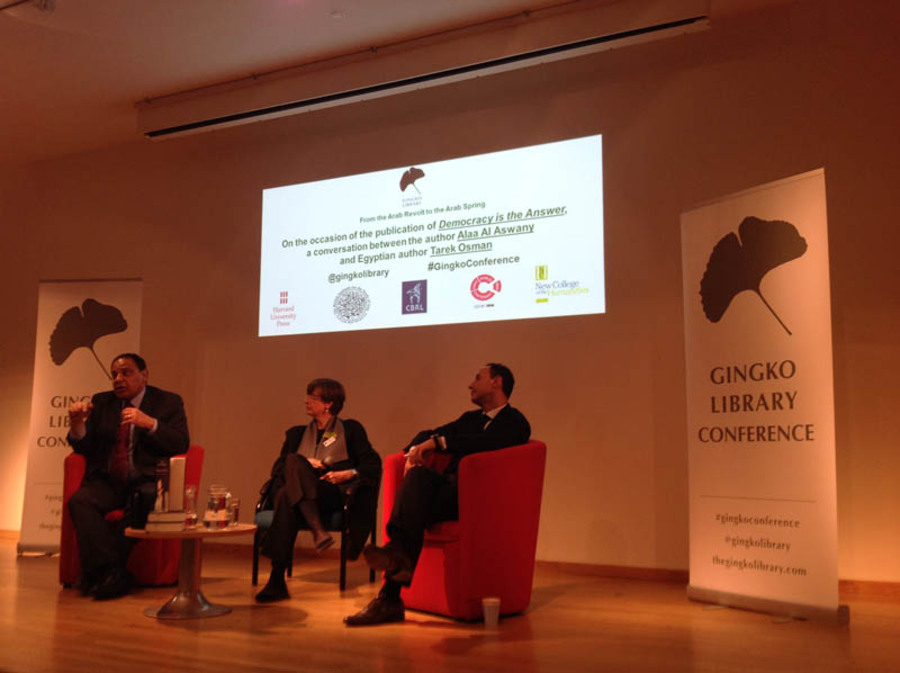World War I and its aftermath in the Middle East
Casa Árabe takes part in this conference, held at the SOAS in London
December 11, 2014
LONDRES
On December 6-7, Casa Árabe took part in the first conference held by the Gingko Library, dedicated to World War I and its aftermath in the Middle East. The conference was held at the School of Oriental and African Studies (SOAS) in London.
The director of the Gingko Library, Barbara Haus Schwepke, explained that the library’s idea is to publish and translate a series of dialogues between East and West, in accordance with ten themed subject areas, from history, art and literature to current affairs. The project is a legacy and pays homage to Mark Linz, a renowned editor and assiduous translator of Arabic literature, who was responsible for the publications by the American University in Cairo for eighteen years, in which he was a pioneer in the English-language distribution of work by Nobel Prize winner Naguib Mahfouz.
Barbara Haus explained why the leaf of the Gingko Biloba plant was chosen as a symbol, its form synthesizing the union of past and present, young and old, the human and the divine, man and woman, East and West. Goethe himself mentions this tree’s leaf in an ode which he dedicated to friendship.
The conference introduction linked the consequences of World War I with the current situation in the Middle East. The alliance which both the United Kingdom and France wove together with minorities increased the potential for sectarianism that is consuming the region today, as pointed out by Anthony Grayling, current director of the New College of the Humanities. As for Leila Fawaz, a professor at Tufts University, she took a closer look at the role played by memory in the formation of identity and the differences existing between what actually happens and what people believe to have happened. One example is how the negative perception of the Ottomans amongst people in the Levant region changed radically when they were replaced by France as the occupying power. She said it is not by chance that the self-named Islamic Army (Daesh) has launched a message on Twitter this year, in which it specifically indicates that it is going to put an end to Sykes-Picot (the agreement signed in 1916).
Fawaz asserted that, if in the West the Great War solidified national identities, in the old lands controlled by the Ottoman Empire it gave rise to an unprecedented dismemberment of societies. Likewise, Hassan Hakimian, director of the London Middle East Institute concluded that our understanding of the past undergoes constant change.
The speakers then dealt with several topics, in which they explored a series of decisive historical episodes and dimensions in World War I in detail, such as the Red Line Agreement (1914-23), in which the main oil companies divided the Middle East up for themselves; the clashes between Russia and the United Kingdom in Iran and their effects on Iran’s state, society and oil industry; minorities during the French and British mandates, and the crystallization of religious identities.
In the afternoon, Egyptian writer Alaa el Aswany presented the book Democracy Is the Solution, a compendium of his articles that will be published in Spanish in 2015. The second day of the conference, he discussed the topic of the formation of national identity, taking into account various factors such as the domination of Cyrenaica in Libya, literary creation in Iran and Turkey, and the role of Arab intellectuals, such as Taha Hussein and Michel Aflaq. The closing plenary session included a presentation of contemporary perspectives in the form of a lively debate amongst specialists on the current effects of the first great war of the twentieth century in the Middle East.
At the conference for the official opening of the Gingko Library, it was announced that the year of 2015 would be dedicated to Iran. A calling was made for justice and the empowerment of peoples to build a strong citizenry; equal opportunities which make it possible to create distance from bombs and oil; placing an emphasis on the wealth to be found in diversity, and the need to reaffirm collective action through human dignity and inclusion of the marginalized. Leila Fawaz pointed out that making use of soft power is a way to escape from polarization, by promoting the shared humanity that brings peoples together.

